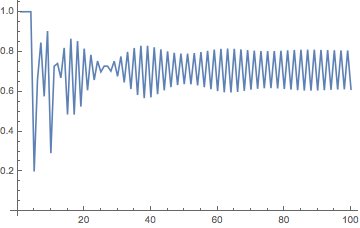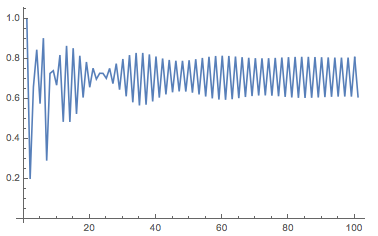This is an extension to a previous question that I never fully answered, but have been better able to define with some new reading (see other question here: Implementing delay in NestList?)
I would like to implement Buchner's Logistic map with delayed feedback:
x(n+1)=(1-K)r*x(n)[1-x(n) + K x(n-k)
where K is the feedback gain and k is the feedback delay. Very helpfully, the above system can be rewritten as a set of k+1 coupled iterated functions with no delay, i.e. (below as equations, not mathematica code):
x1(n+1)=(1-K)r*x1(n)[1-x1(n) + K x2(n)
x2(n+1)=x3(n)
x3(n+1)=x4(n)
...
xk(n+1)=x1(n)
So with a fixed value of k, I can rewrite the system such as:
Module[{K = .2, r = 3.6, x1 = 1, x2 = 1, x3 = 1, x4 = 1, x5 = 1},
dataNest = NestList[
{(1 - K) r #[[1]] (1 - #[[1]]) + K #[[2]],
#[[3]],
#[[4]],
#[[5]],
#[[1]]} &,
{x1, x2, x3, x4, x5},
100];
ListLinePlot[dataNest[[All, 1]]]
]
(The above case should show an oscillatory solution. These kinds of systems are used to examine chaos and nonlinear dynamics.)
I would like to rewrite the above block such that I can specify k and construct the NestList of the appropriate length. I suspect this is not too tricky, but pure functions and slot syntax are still a bit confusing to me.
I think the only tricky bit is the list that goes into NestList, because of the pure function. Creating the initial conditions vector seems easier. So I need a list where the first entry is (1 - K) r #[[1]] (1 - #[[1]]) + K #[[2]], the 2nd through k entries are [[3]] through [[k+1]] and the k+1 entry is [[1]]. Would some syntactically gifted residents offer some guidance?


